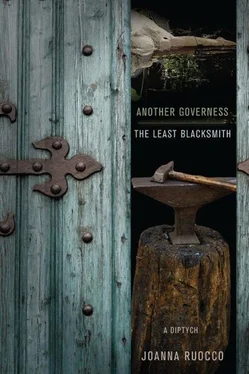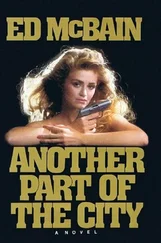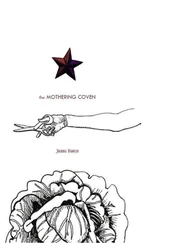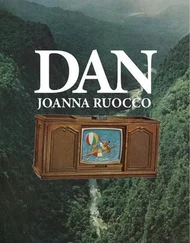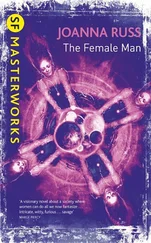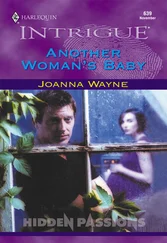One moment our father was tapping the iron with his hammer, standing up, facing my brother across the anvil. He jerked the hand that held the hammer. He tapped his chest with the hammer. My brother struck our father's chest with the sledge. He struck exactly where our father had indicated. Our father's eyes closed. His mouth opened. He turned a quarter-turn. He fell across the hearth. My brother sent me to town to fetch the doctor. The doctor is a thin but purposeful man. He came with me right away. I was afraid that I was leading the doctor to the wrong place. The ground vibrates when you approach the forge. You can hear the clanging of hammer and sledge. The ground did not vibrate. I heard nothing. As the doctor and I came up the hill, I could see the forge. It looked like the forge, but it could not be the forge. That soundless building could not be the forge. The double doors of the forge stood open. There was our father on the floor of the forge. The doctor was surprised to see that our father's face was burned. He took our father's wrist between his fingers. He held our father's wrist. He laid our father's hand on his chest exactly where our father tapped with the hammer and my brother struck with the sledge. The doctor sat back on his heels. He lit a cigar. For a time the doctor did not say anything. My brother and I watched the doctor's lips pull at the cigar. There was no sound in the forge. The doctor smiled. The cigar did not fall because the doctor held the cigar with his teeth. He removed the cigar from his mouth and extinguished the coal with his fingers. He worked the end of the cigar through our father's fingers. Our father held the extinguished cigar on his chest.
The doctor stood and addressed my brother He said that he had been friends with our father when they were small boys. Our father and the doctor played mumblety-peg on the wharves. The doctor had smoked his first cigar with our father. The friendship did not end until they reached adulthood and quarreled over a woman. I never knew our father had been friends with a doctor. It must have been a wonderful friendship if the doctor remembered it so clearly. The doctor offered my brother a cigar. He did not offer me a cigar, although he admitted he had been very young when he first smoked a cigar with our father. Since becoming a doctor he could not offer a cigar to a child. He hoped I understood. My brother dropped his cigar on the floor where it was spoiled by the water he had poured from the tub. I had never seen my brother behave clumsily. He moved about the forge as though he did not know where he was. The doctor said he would take our father's body to his office. At his office, he would be able to reconstruct the last moments of our father's life using his new medical equipment. The doctor had traveled by ship to a conference where he received training on the equipment. The doctor was glad his first clinical trial would be with our father. The doctor said it felt right. My brother did not know how much to pay the doctor. He did not want to show his ignorance about something as important as doctor's fees. He gave the doctor a heavy bag of money, all the money our father had collected to deposit in the bank for the month. The doctor said our father would have been proud of my brother. Even though many years had passed since they played mumblety-peg on the wharves, the doctor still knew a thing or two about our father.
Our father was always proud of my brother. My brother developed quickly. Customers often mistook my brother for our father. Customers who came to the forge greeted my brother by our father's name. Our father's name is also my brother's name. My brother responded politely to the customers. He said that he was not the blacksmith. He was the blacksmith's striker. When the customers saw our father, they realized their mistake. They asked if my brother and our father were brothers. They could not believe that my brother was scarcely more than a child.
My brother did not expect to be blacksmith so soon. The first customers who came to the forge after our father died did not notice that our father was no longer the blacksmith. They saw my brother standing at the double doors of the forge. They were used to seeing two men at the double doors of the forge. They asked my brother what had happened to his striker. My brother said he needed to hire a striker. The customers suggested that he hire his son. My brother did not seem proud that I had been mistaken for his son. He did not respond to the customers.
The forge is on the hill. It has the highest elevation of any business in the town. Our house is behind the forge. Our house is smaller than the forge. There are two windows in the front of the house. You cannot see the bay from the windows. The windows look onto the back of the forge. There are boards nailed on either side of each window. It is as though the windows have shutters. The boards are not shutters. They have no hinges. Our mother nailed the boards alongside the windows for decoration. She liked decoration. I like decoration too. The boards alongside the windows are my favorite thing about the house. Our mother added decoration to the house, but she did not add decoration to the forge. The forge has not changed in any way since the time of our father's father. My brother tells me he will expand and modernize the forge. My brother is a wonderful blacksmith. As soon as he has a striker, he will expand and modernize the forge. I am my brother's only relative. It is best that I work as his striker.
My brother works all day and all night in the forge finishing the job our father could not finish. My brother's lips are dark. The skin beneath his eyes is dark. I sweep the floor and pump the bellows. I watch my brother work alone at the anvil. Sweat pours from my brother. He finishes our father's job. It is a feat to finish the job without our father, my brother alone, working all day and all night at the anvil. He will not be able to finish more jobs alone. The work is too hard without the help of a striker. My brother must hire a striker. It is best for a blacksmith to have a son for a striker. You do not have to pay a son wages. A son works to earn his name.
I want to work for my brother. He does not have to pay me wages. My brother and I live together in the house behind the forge. I do not know what I would do with wages. I could decorate the house with paper notes. The gray and pink paper notes are more appealing than the coins. The coins are nothing special. My brother could strike far finer coins. My brother would not allow me to decorate the house with wages. It is best that I work as his striker for no wages. The wages will be reinvested in the forge.
Finally my brother agrees that it is best. He calls me to the anvil. He hangs a leather apron from my neck. He folds my fingers around the handle of the sledge. I lift the sledge. It wobbles. The sledge wobbles but I hold it upright. I am officially my brother's striker. My brother takes the sledge from my hand. He says we should smoke the doctor's cigar in celebration. My brother had set the cigar to dry in the pritchel hole of the anvil. Now it is dry. You would never know the cigar had lain in the water on the floor of the forge. It catches fire just like a cigar. The doctor smoked his first cigar with our father. I am smoking my first cigar with my brother. The end of the cigar crumbles slightly on my lips and I lick my lips and spit like my brother. We go to the double doors of the forge and stand together looking down at the town. I cannot see the doctor's office, but I remember that the doctor's office is on a dead end street. His office is the same faded color as the other offices in town. It is hard to imagine that inside the doctor's office there is new equipment capable of reconstructing the last moments of a person's life.
Читать дальше
